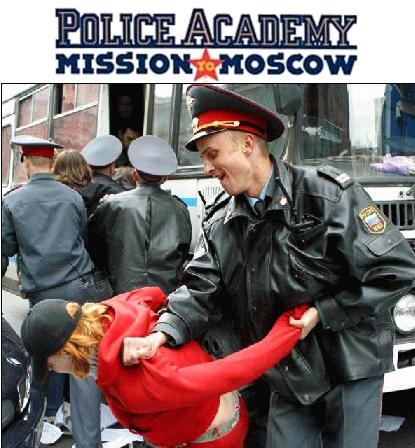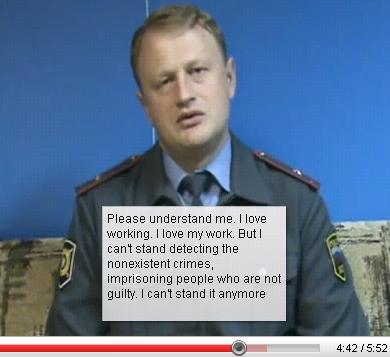
Recently, I was shocked to hear an American friend name one of the virtues of her new house: “there are many police in the neighbourhood”.
You would never hear such a thing come from the mouth of a Russian person, and for good reason.
Calling the cops in Russia risks inviting the sort of treatment Alex got from his former droogs-turned-police officers in the closing part of A Clockwork Orange, because Russia’s militsya continues to prefer upholding its reputation for corruption and extreme violence over upholding the law.
In fact, over last few months alone, Russian police officers were involved in torturing and killing a journalist in custody, a shooting spree, and several revenge murders. Beatings, often against women and vulnerable people, routinely go unpunished and even unmentioned.
Friday’s sentencing of Alexei Dymovsky, the police major from Novorossiisk whose crime was blowing the whistle on law enforcement corruption in a youtube video, was only the latest episode. But at least he got away with his life, unlike others who have exposed police crimes in the past, and as recently as November.
Not surprising, when “30 percent of the country’s police officers are either alcoholics or psychopaths who get their jobs through corrupt connections”, according to veteran Russian criminal psychiatrist Mikhail Vinogradov.

In fact, the state of Russia’s police force has become so dire that one “Interior Ministry official [told] the BBC in August that the situation was “really awful”. “Police officers are not paid properly, so we are only able to recruit the lowest calibre people,” said the unnamed official. “Some of them don’t know the most basic of laws; some even consort with criminal gangs.”
The interior minister has even advised citizens to fight back against the police.
With ordinary Russians taking to the streets, Medvedev has pledged major reforms and restructurings of the police force, raising salaries and decreasing numbers.
If he is serious (didn’t he already promise to clean up police brutality last year?), Medvedev will have an extraordinarily difficult task on his hands: cleaning up a force that has languished in a culture of lawlessness since the early 1990s will take much more than a simple question of a small increase in wages. The problem isnt with a few ‘bad apples’ but rather with the structure of the force itself.
One major systemic problem was raised by Dymovsky in his video: the pressure to fulfill arrest quotas.
According to a major scholarly study of Russian police corruption,
A survey of cadets and recent graduates of a Russian police academy identified “pressure from above to achieve good clear-up rates” as the second most important motive (following “low pay”) for police to use their position for their own ends (Beck & Lee 2002).
But official performance targets also greatly increase the incentives for police to use beatings and torture to compel detainees to “confess” to crimes. A report by Human Rights Watch (1999) cites this pressure from above as an important factor behind the many instances of violent abuses it documents and also provides evidence of gratuitous beatings of indigents and drunks held in “tanks” by the police (see also Moscow-Helsinki Group 2005).
Another investigation has found that, due to the pressures and culture of Russia’s fast-track recruiting procedures, “police recruits think that corruption is often justifiable and/or morally acceptable underparticular circumstances, or for particular goals”.
Unfortunately, prospects for serious reform are dimmed by Medvedev’s decision to retain Nurgaliev, the current interior minister, who “has failed to make any significant inroads into the corruption, unprofessionalism, and demoralization that so deeply undermine the police”.